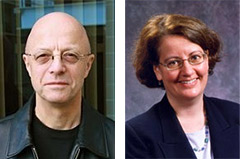.jpg)
By Andrew Cohen
In addition to expanding its full-time faculty in recent years, Berkeley Law has enlisted a growing number of seasoned attorneys to fuel the curriculum. This fall, they are teaching four of the school’s six new courses.
“Adding courses taught by knowledgeable practitioners keeps our curriculum vibrant and current,” said Susan Whitman, Berkeley Law’s assistant dean of academic planning and curriculum coordination. “We’re very fortunate that so many highly experienced attorneys devote their valuable time to teaching our students. It creates a strong bridge between law school and law practice.”
In addition to the four new courses taught by practicing lawyers, there are two new courses in Berkeley Law’s pioneering Jurisprudence and Social Policy (JSP) Program. The first of its kind among U.S. law schools, the Ph.D. program offers a unique interdisciplinary graduate curriculum.
Here’s a look at Berkeley Law’s new courses:
- Drafting and Negotiating Sports Law Contracts: Students will negotiate and draft transaction documents such as sponsorship and suite license agreements. Guest speakers who work for professional sports teams will offer insights on specific substantive areas and share their perspective on how to develop a sports law practice. Instructor Richard Brand, who taught a similar class for many years at Georgetown Law School, is a partner in the San Francisco office of Arent Fox and chairs the firm’s Sports Practice Group.
- Crimmigration: This term refers to the convergence of immigration and criminal law. The class will provide students with an understanding of the immigration consequences faced by noncitizens convicted of crimes. It will also convey best practices for analyzing immigration legal issues under Supreme Court, circuit court, and government agency precedent. The instructor, Raha Jorjani, currently heads the new deportation defense project at the Alameda County Office of the Public Defender.

- Music Law Seminar: Students will probe the legal issues surrounding all aspects of music: writing, recording, performing, distributing, and licensing. They will also explore related topics such as trademarks and rights of publicity, and study how the tension and interplay between music law’s two separate legal foundations—copyright and contract—affect case decisions and legal strategies. Instructor Christopher Harrison is Pandora Media’s assistant general counsel and vice president for business affairs.
- American Jobs Project: This seminar is taught by former Michigan Governor and Attorney General Jennifer Granholm. Students will develop clean energy job creation strategies in 10 states that are critical to shaping national energy policy—and to the 2016 election. Final student reports will be sent to candidates and office-holders of both political parties in each of the focus states. Students will also hear from guest presenters who are experts in clean energy sectors, regulatory reforms, and economic development.

- Readings in Slavery, History, and Law: This JSP course addresses the history of slavery and the law of enslavement in mainland North America through a comparative perspective. The seminar focuses on slavery as a labor system, while also examining it as a social condition. New Berkeley Law professor and top legal historian Christopher Tomlins will help students grasp slavery’s North American origins, legal and moral justifications, expansion, and eventual demise.
- Advanced Interdisciplinary Workshop on Law: Graduate students working on law-related projects will gain helpful feedback on their research papers. Taught by Professor Catherine Albiston, the JSP course will address areas such as generating research questions that contribute to theory and policy, identifying data and data collection strategies, and evaluating research design and feasibility.
“Professor Tomlins’ course showcases cutting-edge work by historians exploring the transnational and cultural dynamics of law, slavery, and economy,” said Calvin Morrill, associate dean of the JSP Program. “Professor Albiston’s writing-intensive workshop offers systematic advice on the ‘hows’ of publishing compelling research in law and social science journals.”